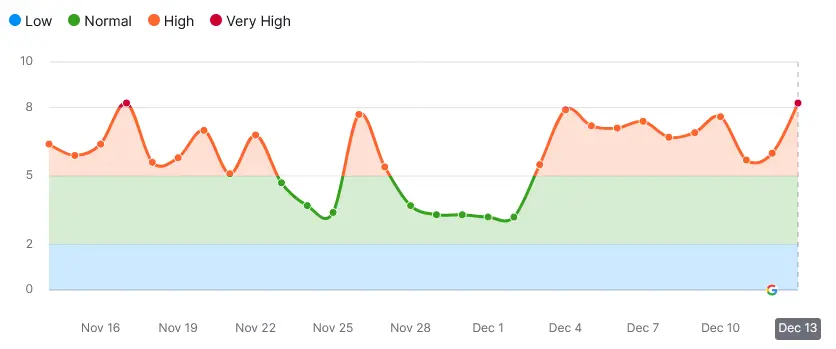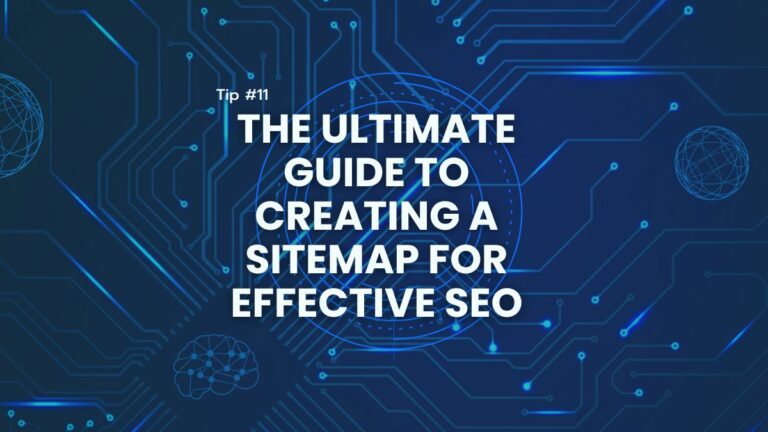
How the Google December 2024 Core Update is Changing Search Rankings
For some site owners and SEO experts, Google is sending a Christmas miracle, but for others, they will get the annual Google piece of coal in their stocking.
Google December 2024 Core Update Rolls Out: What It Means for Your Rankings
The December 2024 Core Update is officially underway, marking Google’s fourth broad core update this year. Following closely on the heels of the November 2024 Core Update, this back-to-back rollout has many SEO experts anticipating changes that could reshape the search landscape heading into 2025. Alongside this year’s significant spam updates and over 1,000 minor adjustments to Google’s algorithms, this update underscores the company’s relentless pursuit of delivering more accurate and relevant search results.
While not every website will experience shifts in rankings, core updates historically trigger significant volatility for some. Websites may see notable changes during the rollout period and in the following weeks as Google’s algorithms reassess and refine rankings. “These updates aren’t penalties—they’re recalibrations,” says Rick Saake, Digital Result’s Head of Digital with over three decades of experience. “The focus is on aligning rankings with the quality and relevance of content as determined by Google’s evolving systems.”
For some, the December 2024 update represents an opportunity to recover from past declines, notably if previous updates exposed weaknesses in content strategy. “We’re advising clients to prioritize user-centric content, especially heading into the first quarter of 2025,” notes Lindsey Linder, an SEO specialist.
Still, the effects of core updates can be unpredictable. “There’s always an adjustment period,” says John Luke, an SEO data and technical analyst specializing in search trends. “We often see rankings fluctuate as the update unfolds and as Google’s systems stabilize post-rollout.” SEO professionals are encouraged to monitor performance metrics closely over the coming weeks and adjust strategies accordingly. Whether your site is impacted or not, the December 2024 Core Update reinforces the importance of maintaining high-quality, user-first content in an ever-changing digital ecosystem.
Details on the December 2024 Core Update
Google has shared limited information about the specifics of this core update. According to their statement, “we have different core systems we’re always improving.” While this implies the update differs from the November 2024 Core Update, the precise distinctions remain unclear.
At its core, the focus seems consistent with Google’s broader goals:
- Promoting Valuable Content: Elevating pages that offer genuinely useful and relevant information.
- Reducing Search Noise: Lowering the visibility of content created solely for search performance without user value.
These themes are familiar and echo statements made during previous updates, particularly the Helpful Content Update, which has now been incorporated into Google’s core updates.
SEO Industry Reactions and Announcements

Danny Sullivan, Google’s Search Liaison, announced this update during the Google Search Central Live event in Zurich (delivered remotely). As expected, the SEO community has responded with mixed reactions, with some lightheartedly noting the similarity between this guidance and past updates like the Helpful Content Update.
The December 2024 Core Update continues Google’s ongoing efforts to refine search quality. As always, the best approach for site owners is to focus on delivering content that meets user needs and aligns with Google’s guidelines for quality and relevance.
Google December 2024 Core Update: Key Facts
Here’s a concise summary of the most important details about the December 2024 Core Update:
- Name: Google December 2024 Broad Core Update – Some are calling it the “Gemini Update”
- Launch Date: December 12, 2024, at approximately 10:46 AM ET
- Rollout Period: Estimated to take around two weeks to fully deploy
- Scope: Evaluates all types of content across websites
- Purpose: Not a penalty-focused update; it aims to reward and promote high-quality web pages
- Global Impact: This core update is worldwide, affecting all regions and languages
- Effect: Involves updates to Google’s core systems, similar to previous core updates
- Features Affected: refines how non-traditional Google results are displayed including, featured snippets, and other search features prioritize and display high-quality, user-focused content across the search ecosystem
- Recovery Advice: If your rankings are affected, review your content and align it with Google’s core update guidance for improvement
How Google Core Updates Work
Google core updates are pivotal changes to Google’s search algorithm aimed at improving the overall quality and relevance of search results. Unlike algorithm tweaks that target specific issues, such as spammy links or low-quality content, core updates are broad and affect how Google evaluates and ranks content. These updates are part of Google’s mission to be the world’s best “answer engine,” delivering accurate, helpful, and reliable information to users.

The Purpose of Core Updates
Core updates assess content more holistically rather than focusing on individual factors. Google continuously evaluates its algorithm against its overarching goal: providing the most relevant results for any given search query. With the web constantly evolving, Google ensures its systems adapt to new trends, technologies, and user behaviors. This dynamic approach allows Google to maintain its status as the leading search engine worldwide.
For example, consider how people search for information. In the early 2000s, searches were primarily keyword-driven, with users inputting simple phrases like “best pizza NYC.” Over time, as user expectations evolved, search queries became more conversational, such as “Where can I find the best pizza in New York City?” Core updates have played a critical role in enabling Google to interpret and respond to these nuanced queries.
A Historical Look at Core Updates
Core updates are not new; they’ve been part of Google’s DNA for years. One notable early change was the Florida Update in November 2003, which marked the beginning of Google’s focus on quality over keyword stuffing. Before Florida, many websites achieved high rankings by cramming pages with keywords, regardless of content relevance. Florida disrupted these tactics, emphasizing the importance of user-focused content.
Fast forward to 2011, Google introduced the Panda Update, targeting sites with thin or low-quality content. This was not a core update but a foundational change that set the stage for future algorithm improvements. Later, in 2012, the Penguin Update cracked down on manipulative link-building practices.
More recently, core updates have become more frequent, with Google announcing them publicly since 2018. For example, the June 2019 Core Update emphasized content authority, trustworthiness, and expertise—elements often referred to as E-A-T (Expertise, Authoritativeness, Trustworthiness), later to become E-E-A-T. This update helped refine how Google evaluates content creators and their websites.
What Happens During a Core Update?
When a core update rolls out, it can shake up rankings across the web. Websites that previously ranked high might see significant drops, while others may experience gains. However, these shifts aren’t penalties; they’re a reflection of how content aligns with Google’s updated criteria.
For example, a website with well-researched, insightful content that wasn’t ranking well before might rise after a core update. Conversely, a site relying on outdated SEO practices may lose visibility. Google often advises website owners to focus on creating high-quality, user-centric content rather than chasing algorithmic loopholes.
Navigating Core Updates
While the exact workings of core updates remain proprietary, Google provides guidance. Website owners should prioritize producing helpful, original, and authoritative content. Following best practices like improving page speed, ensuring mobile-friendliness, and optimizing for user intent can also help.
Google core updates are a testament to the company’s commitment to providing the best possible experience for searchers. By focusing on content quality and relevance, these updates ensure that users continue to find accurate and meaningful information in an ever-changing digital landscape.

Effects of the December 2024 Core Update
The December 2024 Google Core Update continues Google’s tradition of evolving its algorithms to better serve users, promote high-quality content, and combat manipulative tactics. Based on the first day movements, here are some of the things we are seeing:
Increased Focus on High-Quality, User-Focused Content
One of the most consistent themes in recent updates, including the Helpful Content System now integrated into core updates, is rewarding content that genuinely addresses user needs. Sites that created shallow, keyword-stuffed, or AI-generated content without clear value to users saw significant ranking drops. Content that provides in-depth answers, demonstrates expertise, and satisfies user intent will perform better. For instance, blogs offering actionable insights, data-backed advice, and clear examples will likely gain traction. Thin content—pages with minimal effort, vague answers, or excessive self-promotion—will continue to decline.
Google’s mission to be the “world’s best answer engine” drives its algorithmic emphasis on usefulness and relevance. The December 2024 Core Update is likely another step in aligning results with evolving user expectations.
Broader Impact Across Industries
The November 2024 Core Update demonstrated uneven impacts across industries, with health, finance, and e-commerce seeing the most notable changes. Updates often target areas where trustworthiness is critical, such as Your Money or Your Life (YMYL) content.
Industries involving sensitive or high-stakes information (e.g., health advice and financial guidance) will experience more scrutiny. Pages offering content without clear attribution, credentials, or trustworthy sources may see ranking declines. Authoritative, peer-reviewed, or expert-created content will likely rise.
Google prioritizes E-E-A-T (Experience, Expertise, Authority, and Trustworthiness), especially in industries where misinformation could harm users. Recent core updates highlight a commitment to ensuring users receive reliable, well-researched information, particularly in sectors prone to inaccurate or sensationalist content.
Evolving Role of AI-Generated Content
In 2024, Google clarified its stance on AI content, emphasizing that its quality and usefulness matter more than its origin. However, updates have shown that AI-generated content lacking originality or human oversight is penalized. AI-assisted content that is thoughtfully crafted, fact-checked, and supplemented with human expertise will thrive. Conversely, content farms mass-producing AI text with minimal human intervention are likely to lose visibility.
The surge in AI tools in 2024 led to an influx of low-effort, repetitive content. Google has refined its algorithms to detect patterns of over-automation and prioritize unique, human-guided perspectives.
Changes to Google Discover and Featured Snippets
Past updates, demonstrated that core updates often affect features like Google Discover and featured snippets, which rely heavily on user engagement and content relevance. Pages appearing in these features may shift significantly based on the update. Sites producing visually engaging, mobile-friendly content with concise yet informative snippets are likely to see growth in these areas. Poorly optimized or outdated content may lose these coveted placements.
Google Discover and featured snippets are high-visibility areas where user satisfaction is paramount. Algorithms increasingly prioritize mobile performance, visual appeal, and clear, actionable answers that enhance user experience.

Impact on Affiliate and Monetized Websites
Affiliate websites have faced increased scrutiny in recent updates, particularly when their content lacks depth or provides generic product recommendations. Many affiliate-heavy sites have already reported significant ranking losses. Sites with well-researched reviews, genuine user feedback, and clear value propositions will outperform those relying solely on affiliate links and minimal content. Pages designed primarily to drive clicks and sales without offering genuine insights are likely to see declines.
Google aims to promote content that serves the user first. This is especially true for product-focused searches, where users expect detailed comparisons, real-world use cases, and transparency.
Refinement of Mobile and Core Web Vitals Standards
Mobile usability and Core Web Vitals (factors like page speed, interactivity, and visual stability) have been ongoing priorities for Google. These elements played a role in previous updates and are likely to remain influential. Websites with slow load times, poor mobile optimization, or intrusive interstitials will lose rankings. On the other hand, sites that prioritize seamless, user-friendly mobile experiences and meet Core Web Vitals benchmarks will continue to gain.
The majority of web traffic now comes from mobile devices. Google’s algorithm reflects this reality, ensuring mobile users have a positive experience. Core Web Vitals metrics act as a quantitative measure of this user experience.

Regional and Language Adjustments
Google’s core updates are global, but their effects can vary based on region and language. Previous core updates have highlighted disparities in impact between different geographic areas and languages, especially where content quality varied. Regions and languages with less developed content ecosystems may experience more dramatic shifts. As Google refines its algorithms, localized search results will better reflect the highest-quality content available in those languages.
Google continually enhances its ability to evaluate content quality in multiple languages. The December 2024 Update is likely another step in closing gaps between regional search quality.
Greater Integration of Multimedia Content
In the past, Google has emphasized multimedia content more, rewarding pages that effectively incorporate images, videos, and interactive elements. This trend is expected to continue. Pages with engaging videos, well-optimized images, and interactive elements that enhance user understanding will perform better. Text-only content, especially for queries where multimedia is beneficial, may see declines. User preferences lean toward diverse content formats. For example, instructional searches often benefit from video tutorials, while visual content helps in e-commerce and travel-related searches. Google recognizes these preferences in its updates.
Adapting to the December 2024 Update
The December 2024 Core Update reinforces Google’s commitment to delivering high-quality, user-focused search results. By examining recent updates, several trends emerge: a focus on E-E-A-T, scrutiny of AI content, and prioritization of multimedia and mobile performance. For website owners, the best course of action is to prioritize creating valuable, trustworthy content that serves user intent.
While the specific mechanics of the December 2024 Update will unfold over time, its effects will likely reflect Google’s evolving approach to balancing technological advancements with the need for reliable and engaging information. Website owners who adapt to these changes can position themselves for long-term success in the ever-shifting landscape of search.






